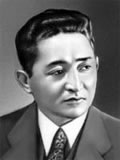Hamid Olimjon
Hamid Olimjon (in Cyrillic script Ҳамид Олимжон, Russian Хамид Алимджан Chamid Alimdschan ; often Hamid Alimjan ; * 1909 ; † July 3, 1944 ) was an Uzbek poet.
Life
Olimjon came from Jizzax and studied in Samarkand . He was a member of the literary circle Qizil Qalam , in the Komsomol and began to write around 1926. In 1929 his first volume of poetry, Koʻklam , appeared .
In March 1934 he took part in the first congress of the Uzbek Writers' Union in Tashkent , and in May 1937 in the first ten-day festival of Uzbek art in Moscow .
From 1939 until his death in 1944 in a traffic accident in Tashkent, Olimjon was the executive secretary of the Uzbek Writers' Union. From 1943 he was also a member of the Soviet Academy of Sciences. His wife, Zulfiya , was also a well-known Uzbek poet.
plant
Hamid Olimjon, himself a member of the CPSU , wrote several dramas and propagandistic-patriotic works, but also defended Cho'lpon's line of criticism from the Soviet Union of the 1920s. Like Elbek, it was particularly well-known for a form of literature that adapted orally transmitted fairy tales, epics and fables.
His early works were said to have been influenced by Vladimir Vladimirovich Mayakovsky , whom Olimjon met in 1929, although they bore more resemblance to anti-Soviet nationalist artists. Muqanna , a dramatic work that premiered at the Hamza Theater in 1943 , was retired by critics in 1946 because of its “preoccupation with the feudal past”. The Great Soviet Encyclopedia promises Olimjon's poems a "great artistic mastery".
In the 1930s he wrote Nima bizga America? (“Why do we care about America?”), Which followed the Russian propagandistic - anti-Americanist line. During the Second World War , Olimjon wrote, among other things, together with Gʻafur Gʻulom collective letters, a special form of literature of the Uzbek SSR in verse form, such as a letter from the Uzbek people to the Great General of the Patriotic War , Comrade Stalin .
Today a station on the Tashkent Metro is named after Hamid Olimjon.
literature
- Edward Allworth: Uzbek Literary Politics . Mouton & Co., The Hague 1964
| personal data | |
|---|---|
| SURNAME | Olimjon, Hamid |
| ALTERNATIVE NAMES | Алимджан, Хамид (Russian); Alimjan, Chamid; Alimjan, Hamid |
| BRIEF DESCRIPTION | Uzbek poet |
| DATE OF BIRTH | 1909 |
| DATE OF DEATH | July 3, 1944 |
| Place of death | Tashkent |
